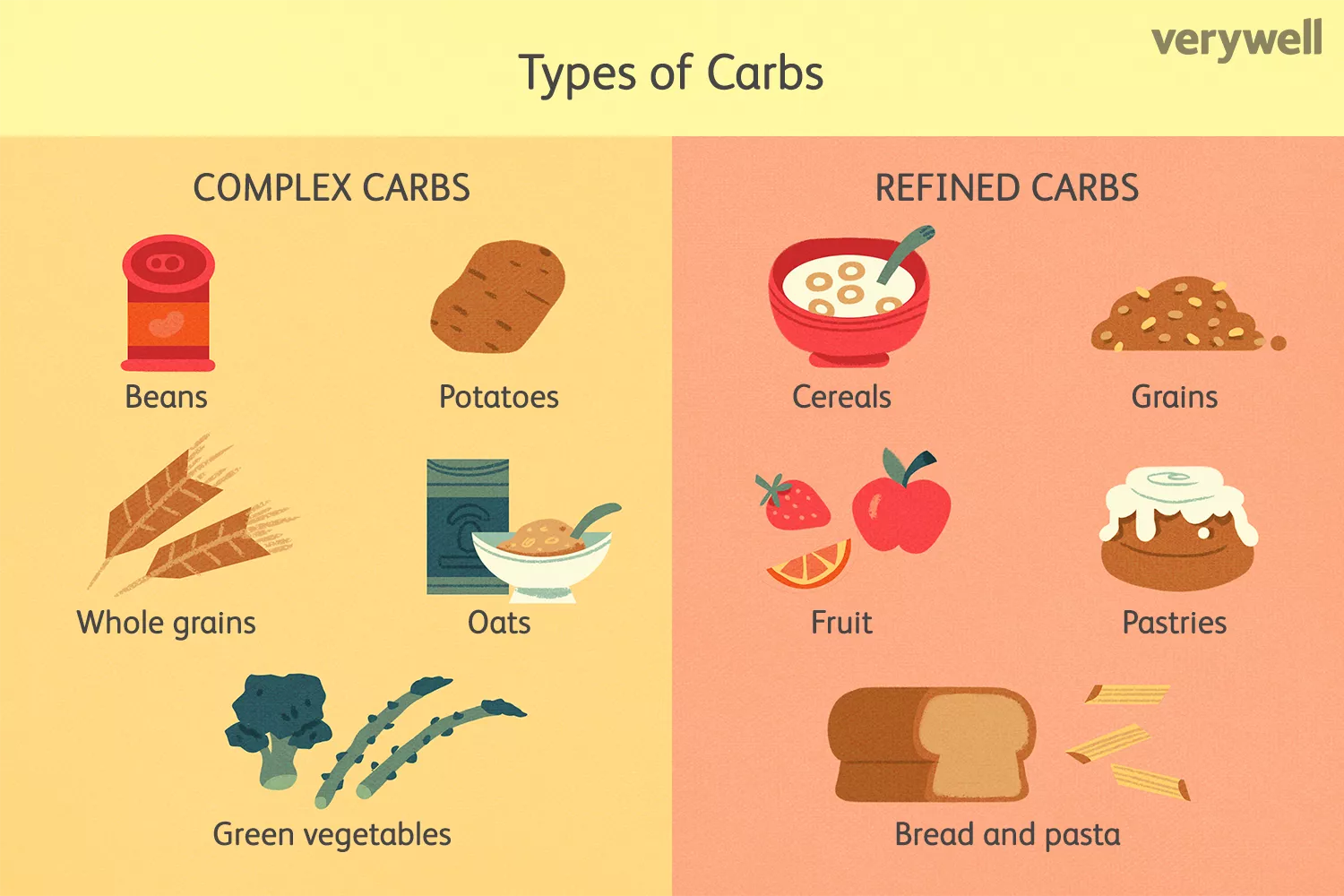Carbohydrates, commonly referred to as carbs, can be downright confusing. Some claim eating carbs can hinder weight loss and cause weight gain while others say carbs are an essential part of every diet.
Carbs themselves don't make you gain weight—excess calories do. So, when it comes to carbs and weight gain, what really matters is the kind of carbs you eat, how much you consume, and what you replace them with if you cut back.
Learn more about carbs and how to enjoy them as a part of a healthy diet.
What Are Carbs?
Carbs play an important role in your diet. When we eat carbohydrates, our body converts them into glycogen (sugar) supplying our bodies with energy. In fact, carbs are your body's main fuel source.
The U.S. Department of Health and Human Services recommends that 45% to 65% of an adult’s daily calorie intake come from carbs, with the remainder from protein and fat. Along with proteins and fats, carbohydrates are one of the three macronutrients your body needs for optimal functioning.
Types of Carbs
Different types of carbohydrates exist in various foods. Complex carbs are found naturally in whole foods, while refined carbs are manufactured to be included in processed foods. Although there's really no "good" or "bad" food, all carbs are not created equal. Certain carbs are better for your health than others.
Complex Carbs
Complex carbs tend to be high in fiber. They take longer to digest than other carbs, keeping you satisfied and feeling full for a long time. Most carbs you eat should be complex. Examples of foods containing complex carbs include:
- Beans
- Green veggies
- Oats
- Potatoes
- Whole grains
For example, whole-wheat bread has more complex carbs than white bread, and brown rice more than white rice.
Refined Carbs
You should limit refined carbs like processed white bread and cake. The refinement process removes much of the fiber and nutritional value, leaving you with sugary carbs and empty calories that can lead to weight gain. Because your body processes refined carbs quickly, you're hungry again sooner, which means you're likely to eat more throughout the day.
Examples of foods containing refined carbohydrates include:
How Carbs Impact Weight
The fact is, carbs don't cause instant weight gain. However, starchy carbs do tend to be calorie-dense. Consuming these extra calories is what causes weight gain. Even some complex carbs can be calorie-dense, however, so be mindful of your serving size if you wish to avoid weight gain.
Some research suggests consuming fewer carbs can reduce cravings for unhealthy foods. This can be helpful for managing weight gain.
Finding a Healthy Balance
When it comes to eating carbs, it's all about balance. Sure, it’s a problem if your diet consists only of carbs, but it’s also problematic if you skip them completely.
Low-carb diets have gone through periods of being popular for weight loss, but they are not without their drawbacks. Plus, none of them are guaranteed to make you lose weight. Many experts question the safety of low-carb diets because of fears they can contribute to complications like heart disease.
When you follow a diet plan that requires restricting carbs, your body may experience what is commonly known as "carb flu" or "keto flu," which draws its name from the popular ketogenic diet. When you restrict your carb intake, your body burns fat for energy instead, but unfortunately, this can lead to flu-like symptoms and more.
Side effects of severe carb restriction can include:
- Depression
- Dizziness
- Fatigue
- Nausea
- Weakness
Consuming Carbs
To manage your carb intake, read nutritional labels, practice portion control, and be mindful of proper serving size guidelines. You can enjoy carbs in moderation and add healthy, low-calorie vegetables to round out your meals.
If you eat too many calories, you can gain weight whether those calories are from carbs or not. If you decrease your carb intake, likely your most significant source of calories, you may decrease your caloric intake overall, but this really depends on what you replace those carbs with. Choose lean protein and healthy, unsaturated fats, and consider tracking your calories.
Although it may seem counterintuitive to include more fat in your diet to avoid weight gain, some fats, like omega-3 fatty acids, help your body to function more effectively and may contribute to a decreased risk of heart disease. Overall, moderation is key.
A Word From Verywell
Carbs are a necessary part of your diet, and they can be a delicious addition to any meal, but consuming too much of any one type of food group or nutrient is not recommended for a healthy diet. It's important to stick to a well-rounded meal plan, rich in key nutrients for optimal health.

:max_bytes(150000):strip_icc():format(webp)/Lisa-Lillien-660-198d660d80324f478f14defe4daf78ce.jpg)
:max_bytes(150000):strip_icc():format(webp)/vwt-renpho-elis-chroma-aspire-smart-scale-casey-fuller-13-1a83a4a7119f41d38bb6c3f6e8c04d4a.jpeg)
:max_bytes(150000):strip_icc():format(webp)/GettyImages-469057872-56aa071f3df78cf772ac12ef.jpg)
:max_bytes(150000):strip_icc():format(webp)/young-lady-look-at-nutrition-labels-in-supermarket-175777523-57f3be453df78c690f33544b.jpg)
:max_bytes(150000):strip_icc():format(webp)/smiling-woman-driving-car-and-eating-pretzel-761610313-5be88c5446e0fb002613af8c.jpg)
:max_bytes(150000):strip_icc():format(webp)/200462290-001-56aa055b5f9b58b7d00080c5.jpg)
:max_bytes(150000):strip_icc():format(webp)/usa-new-jersey-jersey-city-fresh-fruits-on-weight-scale-116361546-5785543f5f9b5831b512bb47.jpg)
:max_bytes(150000):strip_icc():format(webp)/how-to-manage-diet-fatigue-and-stress-3495309-notext-FINAL-ff2853ed5049472e84005df41a091663.png)
:max_bytes(150000):strip_icc():format(webp)/big-salad-with-protein-d48c59ac27cf49d9b4e6bd749edf4cbd.jpg)
:max_bytes(150000):strip_icc():format(webp)/woman-sitting-by-the-sea-using-a-digital-tablet-158987420-582b54523df78c6f6acbd98b.jpg)
:max_bytes(150000):strip_icc():format(webp)/fruit-smoothie-2-70b996c2bf5645b0a3adab1380820c72.jpg)
:max_bytes(150000):strip_icc():format(webp)/hiking-outside-GettyImages-184115499-57967e3e5f9b58461ff167dd.jpg)
:max_bytes(150000):strip_icc():format(webp)/GettyImages-1305213194-23eb647dd321453b9235cfe59261265e.jpg)
:max_bytes(150000):strip_icc():format(webp)/GettyImages-617570371-3227b44c22cb4fe5a500b207cbe68687.jpg)
:max_bytes(150000):strip_icc():format(webp)/GettyImages-1309299401-167fc1fb333a48048e3d39329633eb56.jpg)
:max_bytes(150000):strip_icc():format(webp)/GettyImages-1396858974-945a75e1562640e3b8f42f106c524e99.jpeg)
:max_bytes(150000):strip_icc():format(webp)/old-wooden-table-with-stevia-granules--selective-focus--532975562-a6cefb67423a400da1c82952e3ae870d.jpg)